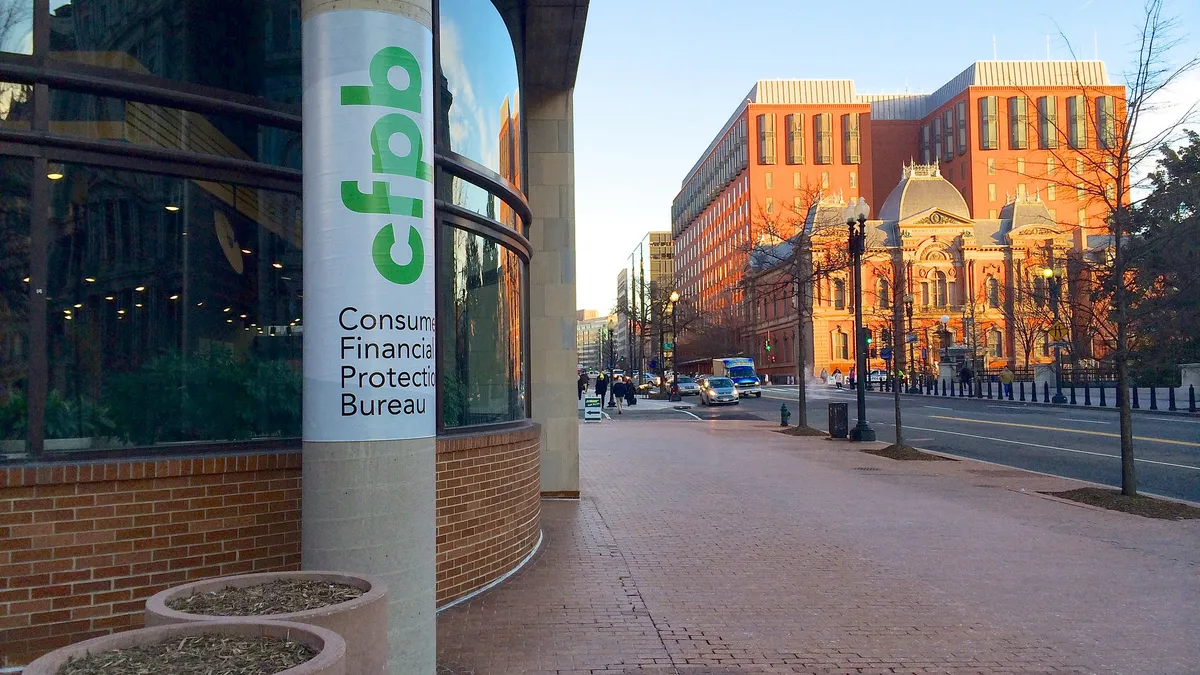Dive Brief:
- Synchrony Financial gained access last week to the Consumer Financial Protection Bureau's (CFPB) compliance assistance sandbox. This action gives the credit card issuer a three-year safe harbor from liability under the Truth in Lending Act and Regulation Z while it develops a "dual-feature credit card" for consumers with a limited or damaged credit history.
- The bureau on the same day granted the fintech Payactiv a similar sandbox safe harbor — but for two years — over a product that offers workers access before payday to wages they've earned.
- In a separate action last week, the CFPB fined Nevada-based Omni Financial nearly $2.2 million over alleged violations of the Military Lending Act.
Dive Insight:
The Synchrony and Payactiv agreements feed into the CFPB's mission to facilitate consumer access to innovative products while ensuring the markets for such products and services remain fair, transparent and competitive, the bureau said in its approval orders last week.
But companies have sparingly used the CFPB's development tools. Synchrony and Payactiv's sandbox agreements are the only active ones of their kind. (Another company, Build Commonwealth, applied for a compliance assistance statement of terms template.) The bureau, meanwhile, has granted no-action letters to a handful of companies. Alternative lender Upstart in November received a renewed three-year term to develop its automated underwriting model after its initial 2017 letter expired. Bank of America received a no-action letter, also in November, for its upcoming Balance Assist small-dollar loan product. And JPMorgan Chase received a no-action letter in September over a mortgage lending initiative.
Synchrony's sandbox endeavor concerns a secured credit card the company would offer at a lower interest rate to users with limited or damaged credit. The cardholder, after 12 months, could choose to transition to unsecured credit.
Payactiv's approval comes a month after the bureau issued an advisory opinion in an attempt to resolve regulatory uncertainty surrounding the conditions under which earned wage access programs offer "credit" under Regulation Z. Some early wage access products have drawn fire over adjacent fees detractors have characterized as excessive or hidden.
The Omni consent order
The CFPB's consent order against Omni alleges the company, since 2016, has violated the Military Lending Act by requiring loan repayment through allotment, a system where borrowers designate a portion of their paycheck to pay off loans automatically.
"The allotment system was intended to help ensure that servicemembers could pay their obligations while they were deployed or otherwise unavailable to handle personal finances," the CFPB said in its order last week. "Over the years, this has become less necessary as technology has made it easier to make payments automatically or remotely."
In addition to paying a $2.175 million civil penalty, Omni must notify all customers repaying their loans by allotment of the CFPB's findings and inform them they may change their repayment method.
"Affected Consumers have been harmed in the amount of interest and fees paid because they were wrongfully deprived of the option to pay by means other than allotment," the order said.
The CFPB also alleged that Omni violated the Electronic Fund Transfer Act by requiring borrowers to preauthorize electronic fund transfers as a condition of receiving credit.













